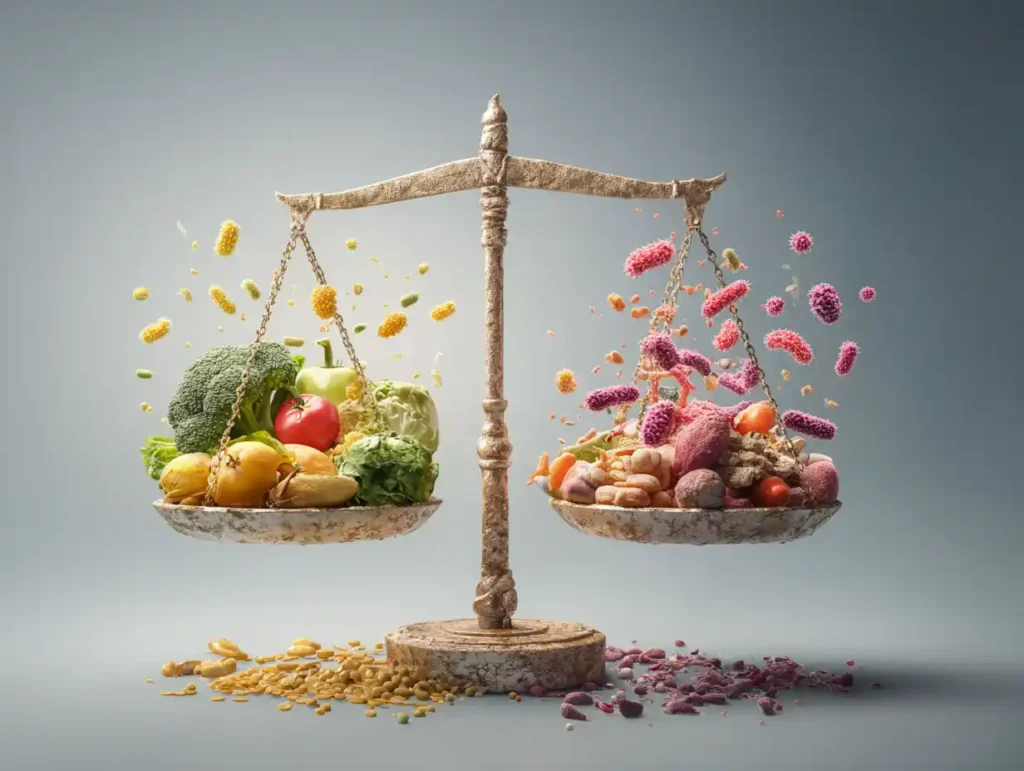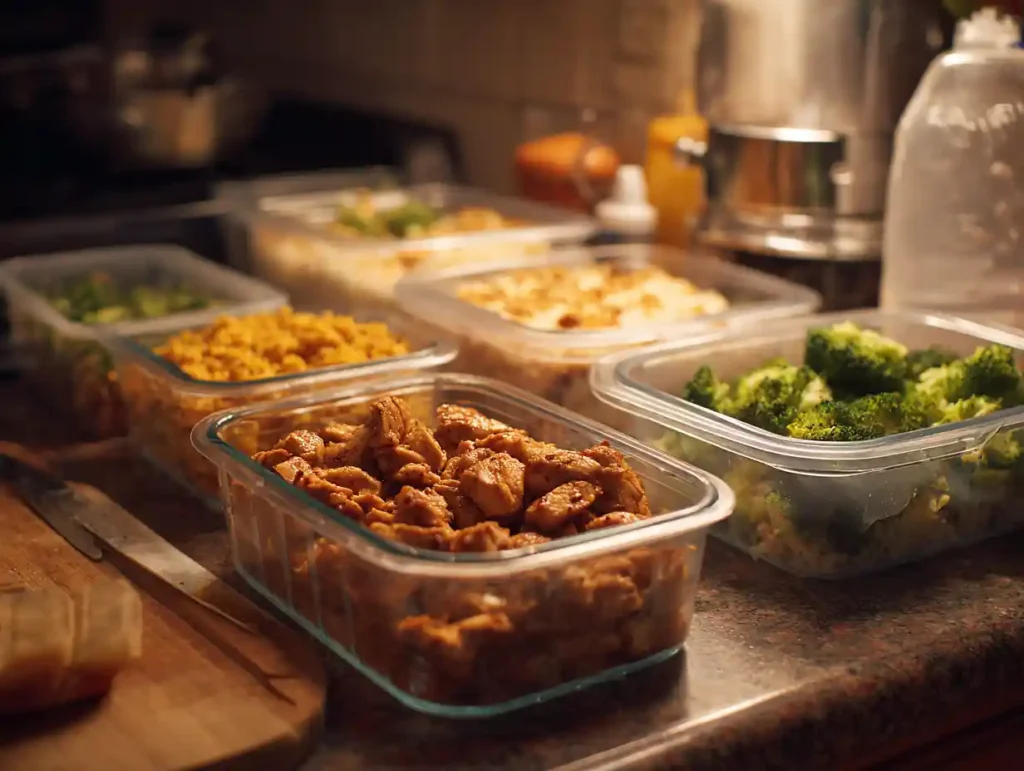What are the downsides of meal prepping? If you’ve ever searched this question, chances are you’re feeling overwhelmed, bored with repetitive meals, or wondering if all that effort is truly worth it. This article takes a deep, honest look at the hidden drawbacks of meal prepping from the nutritional and psychological impacts to time constraints, food safety risks, and more. By the end, you’ll understand both the practical and personal costs that come with this popular routine.

I’ve tried meal prepping dozens of times from Sunday batch-cooking chicken, brown rice, and roasted veggies into identical glass containers, to experimenting with low-carb and Whole30-friendly recipes. At first, I felt productive. But after a few weeks, the spark wore off. My fridge was full, yet I didn’t want to eat anything in it. The food tasted dull, I craved variety, and worst of all, I felt stuck in a routine that was supposed to simplify life. If you’ve felt the same, you’re not alone and you’re not wrong to question it.
Jump To
Is Meal Prepping Healthy or Harmful?
Meal prepping is often praised as the cornerstone of healthy eating a way to take control of your diet, save money, and avoid fast food traps. But is meal prep for a week actually healthy, or can it become harmful over time? The answer depends on how it’s done, how long meals are stored, and the psychological effects it may have on the individual.

Food Safety and Microbial Growth
Storing pre-cooked meals for too long can also pose health risks. According to the U.S. Food and Drug Administration (FDA), cooked food should be refrigerated within two hours and consumed within 3 to 4 days to prevent the growth of harmful bacteria like listeria monocytogenes or salmonella. Many meal preppers, however, prepare meals for the full week sometimes eating dishes five to six days after cooking, which increases the risk of foodborne illness.
Using BPA-free airtight containers, labeling meals by date, and freezing portions you won’t eat within 3 days are smart strategies but only if they’re followed consistently.
Psychological Health and Relationship With Food
While structured eating can be empowering, rigid pre-cooked meals may foster a restrictive mindset that blurs the line between discipline and obsession. For some, especially those recovering from disordered eating, the act of weighing, portioning, and repeating meals can trigger anxiety or guilt when they deviate from the plan. The National Eating Disorders Association (NEDA) notes that highly structured diets may reinforce patterns of orthorexia an unhealthy fixation on eating “correctly”.
The Verdict
Batch cooking can be healthy if done with balance using proper storage practices, rotating diverse foods, and allowing room for flexibility. But when it becomes rigid, nutritionally lacking, or emotionally draining, it shifts from helpful to harmful. Like any wellness habit, context matters more than the habit itself.
What Are the Downsides of Meal Prepping?
Meal prepping is widely promoted as a way to eat healthier, save time, and reduce daily stress but it comes with its own set of drawbacks. For some people, these downsides can significantly impact their relationship with food, their schedule, and even their physical health.

Understanding the meal prep disadvantages can help you decide whether this approach truly fits your lifestyle.
- Reduced Meal Flexibility
Once meals are pre-cooked and portioned, there’s little room for change. Cravings, social outings, or sudden appetite shifts often go ignored, leading to food waste or eating out of obligation. - Declining Food Quality
Even with refrigeration, the texture and flavor of food deteriorate over time. By day four or five, meals can taste bland or become unappetizing especially items like roasted vegetables, rice, or grilled chicken. - Monotony and Food Fatigue
Eating the same meal multiple times a week (like a batch of turkey and quinoa bowls) can cause taste fatigue, making you less likely to stick with your plan and more likely to indulge in impulsive snacks or takeout. - High Upfront Costs
Bulk ingredients, quality storage containers (like BPA-free or glass sets), and occasional food waste all contribute to the hidden financial costs of weekly planning. - Storage Limitations
Not everyone has the freezer or refrigerator space to store five to seven full meals. Limited space can lead to unsafe stacking, uneven chilling, or skipping meals to avoid sorting through crowded shelves.
Each of these meal prep disadvantages can reduce the practicality of this habit, particularly for people with unpredictable schedules, texture sensitivity, or limited kitchen space.
Who Should Avoid Meal Prepping?
Meal prepping isn’t for everyone and that’s not a failure, it’s a fact. While it works well for people who thrive on structure and routine, others may find that it creates more problems than it solves. In some cases, it can interfere with flexibility, mental health, or even nutritional needs. Understanding who should avoid meal prepping helps clarify why this popular habit isn’t universally beneficial.
1. People With Highly Unpredictable Schedules
If your work hours or daily commitments shift frequently as with nurses, freelancers, parents of young children, or those in gig work a rigid meal plan can cause more stress than relief. Prepping meals you may not have time to eat, or being forced to reheat food when you’re not in the mood, leads to waste and frustration.
2. Those With a History of Disordered Eating
Structured eating can be helpful in recovery but not always. For people with past or current eating disorders, this habit, can reinforce restrictive behaviors, fuel obsessive tracking, and increase anxiety around food. According to the National Eating Disorders Association (NEDA), overly rigid food rules are a known risk factor for relapse, especially in those recovering from orthorexia or binge-restrict cycles.
3. Individuals Who Crave Variety
If you’re someone who values spontaneity and diverse food experiences, eating the same meal several times a week can quickly feel restrictive. This can trigger food boredom, leading to skipped meals, cravings, or impulsive eating ultimately defeating the purpose of planning ahead.
4. People Without Reliable Food Storage
Safe and effective meal prep requires sufficient fridge and freezer space, plus access to high-quality containers. If you’re working with limited kitchen space or poor refrigeration, meal prepping for a week can pose food safety risks, including increased chances of spoilage or bacterial growth.
5. Those With Changing Nutritional Needs
Athletes in training cycles, people recovering from illness, or individuals with hormone-related appetite shifts (e.g., during pregnancy or perimenopause) often experience fluctuating dietary needs. In these cases, pre-set meals can become mismatched with the body’s real-time requirements, making intuitive eating difficult.
Meal prepping isn’t inherently harmful but it’s not a one-size-fits-all strategy. If any of the above apply to you, it may be worth rethinking the approach, or adopting more flexible alternatives like batch cooking individual ingredients or prepping only for the next 1–2 days.
Pros vs. Cons of Meal Prepping: A Quick Comparison
Meal prepping comes with both advantages and drawbacks, and whether it works for you depends on your goals, lifestyle, and mindset. Below is a clear side-by-side comparison of the pros and cons of meal prep, helping you assess the trade-offs before committing to the routine.
| Pros of Meal Prepping | Cons of Meal Prepping |
|---|---|
| Saves time during the week | Time-consuming to plan and prep in advance |
| Encourages consistent, balanced nutrition | Food can lose freshness and nutrients over time |
| Helps control portions and meet dietary goals | Limited flexibility hard to adapt to cravings |
| Reduces impulsive or unhealthy food choices | Repetitive meals can lead to food boredom |
| Saves money by cooking in bulk | Upfront costs for storage containers and bulk food |
| Minimizes grocery trips and waste | May create guilt when plans change |
| Supports goal tracking (e.g., macros, calories) | Can feel rigid or obsessive for some individuals |
This snapshot captures the core pros and cons of meal prepping. If the benefits support your current needs, and the downsides feel manageable, this routine may be a good fit. But if the system feels too rigid or draining, other flexible strategies like batch cooking or planning only 2–3 days ahead might be more sustainable.
How to Avoid the Downsides of Meal Prepping
While meal prepping has clear disadvantages, from food fatigue to rigid routines, many of these issues can be reduced or avoided entirely with a more flexible, personalized approach. Below are practical strategies to help you enjoy the benefits of meal prep without falling into its common traps.

1. Prep Ingredients, Not Full Meals
Instead of assembling full dishes, prepare versatile ingredients in bulk such as grilled chicken, roasted vegetables, brown rice, or quinoa. This gives you flexibility to mix and match throughout the week, reducing food boredom without adding much prep time.
2. Keep It to 2–3 Days at a Time
Limit your meal prep to shorter windows ideally two or three days. This improves freshness, lowers food safety risks, and gives you space to adjust if your schedule or appetite changes midweek.
3. Freeze Extra Portions Safely
If you do prep for a full week, freeze meals you don’t plan to eat within four days. Use freezer-safe glass containers, and label meals with prep dates. Reheat thoroughly to at least 165°F to reduce any foodborne risk.
4. Rotate Flavors and Textures
Avoid repetitive meals by changing up sauces, spices, and side ingredients. For example:
- Swap dressings (pesto, tahini, vinaigrette)
- Use different protein bases (tofu, eggs, turkey)
- Alternate between grains (couscous, farro, sweet potato)
Small variations keep food interesting without major extra effort.
5. Build in Flexibility
Leave at least one or two dinners unplanned each week. This creates space for social meals, cravings, or last-minute changes reducing guilt and increasing sustainability.
6. Focus on Satiety, Not Just Calories
Make sure your prepped meals are satisfying. Include healthy fats (like avocado or olive oil), fiber-rich foods (vegetables, beans), and enough protein to avoid cravings later in the day.
7. Use Tools That Support, Not Control
If you track macros or calories, use apps like MyFitnessPal or Cronometer as guides not rigid rules. Let them inform your choices, not dictate them.
Avoiding the downsides of meal prep doesn’t mean abandoning structure altogether it means adjusting your approach so that it works for you, not against you. With a little planning and flexibility, you can keep the benefits while sidestepping the burnout.
FAQ
What are the negatives of meal prep?
Loss of variety, reduced flexibility, nutrient decline, and potential food waste
Is meal prepping actually healthy?
It can be, if meals are stored safely and rotated regularly.
What are the disadvantages of pre-prepared food?
It may be less fresh, lower in vitamins, and harder to adjust to daily appetite changes
Conclusion
Meal prepping can absolutely support a balanced lifestyle but only when it matches your needs, not your ideal. It’s easy to fall into the trap of thinking more planning equals more success, but sometimes, the most sustainable habits are the ones that leave room to breathe.
Personally, I’ve learned to stop chasing perfection in meal prep. I no longer force myself to eat what I made just because it’s there. Instead, I prep with care choosing foods I enjoy, keeping variety in the mix, and allowing space for change. Meal prep isn’t just about efficiency; for me, it’s become a quiet form of self-care. Not rigid, not exact just helpful enough to make my week easier without stealing the joy from food.
